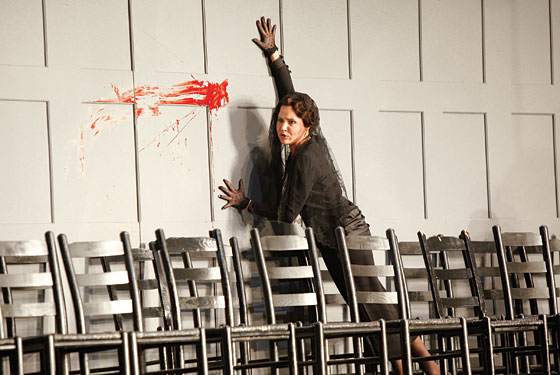The New York Times
November 10, 2009
The Seducer's New Clothes (and Bad Old Ways)
By ANTHONY TOMMASINI

In planning New York City Opera's comeback 2009-10 season, George Steel, the company's new general manager and artistic director, knew that the budget would allow him just one chance to make a statement with a new production of a standard repertory work. He approached the director Christopher Alden, known for revisionist stagings of the staples, filled with striking, often jarring modern imagery. They chose Mozart's “Don Giovanni” as a project. They chose well.
The company's dark, erotic and vividly theatrical new “Don Giovanni” opened at the David H. Koch Theater on Sunday afternoon with a young and appealing cast, headed by the Canadian bass-baritone Daniel Okulitch in the title role, making his City Opera debut. The conductor, Gary Thor Wedow, drew an interestingly subdued performance from the orchestra.
Mr. Alden's production shows that a bold concept, if followed through with consistency and imagination, can chip away encrusted staging habits and revitalize a masterpiece. Working with the set designer Paul Steinberg and the costume designer Terese Wadden, Mr. Alden places the story in an ambiguous modern setting: a large room with walls of gray wood paneling and bright white plaster. Industrial lights dangle from ceiling cords. A neon crucifix glares from the wall.
In the background, the participants in the story, including the choristers, dressed in outfits of roughly the 1930s, all in shades of black and white, sit impassively facing the audience in two rows of wooden chairs. All, that is, except Don Giovanni, in a three-piece black suit with a black eye mask, who slumps in a chair off to the side by himself.
Is this a room in a palace? A church rectory? A courtroom with the cast as witnesses to the trial of Don Giovanni?
As the opera begins, Leporello, Jason Hardy, a boyish bass, rises from a chair to complain about working for the reckless Don Giovanni. Sometimes Mr. Alden meticulously follows the details of the story. During the attempted-rape scene, Donna Anna wears a nightgown, and her father, the Commendatore, appears in pajamas, which makes sense, since the seducing Don has entered the house at night.
Yet when the Commendatore, the bass Brian Kontes, challenges the Don to a duel, there is no sword fight. Instead, Giovanni smashes the old man's head against the wood paneling, making a horrible smacking sound and leaving a splattered patch of blood.
Mr. Okulitch does not have the trademark swagger or large, seductive voice of a typical Giovanni. Still, he sings with richness, vigor and subtle lyricism and brings a dark, brooding quality to the character. When not in a scene, he sits to the side, grim and pensive. And he conveys his aristocracy through his manner and dress: his elegant suit, stylish haircut and narcissistic preening. All the characters, even the men, seem drawn to him. Leporello, in moments of confusion, hugs his boss about the waist, as the Don strokes his hair, suggesting the servant's emotional dependency on his volatile master.
In the scene in which Don Giovanni, intent on seducing Donna Elvira's maid, forces Leporello to switch clothing with him, Mr. Okulitch and Mr. Hardy have matching black briefs over which they each wear half of a single suit: Giovanni, the jacket; Leporello, the pants. When they switch identities, they trade suit parts, again a vivid metaphor, and made more striking because both singers are so buff.
It was also an enticing idea to have the Commendatore appear in the late scenes not as a statue but as a corpse singing from an open coffin at a funeral service. When Giovanni is punished, there is no hellish fire and brimstone, just a little boy who takes his hand and directs him into the coffin.
Donna Elvira, the compelling, rich-voiced Keri Alkema (formerly a mezzo-soprano, making her role debut as a soprano), carries a beat-up suitcase, a poignant symbol of this obsessed character's pursuit of Giovanni, who has jilted her. The soprano Stefania Dovhan brought impetuousness and a bright and strong if somewhat grainy voice to the role of Donna Anna. The soprano Joélle Harvey, as Zerlina, and the baritone Kelly Markgraf, as Masetto, made a wonderfully rustic couple. The tenor Gregory Turay showed his genuine vocal gifts as well as signs of strain in his uneven performance as Don Ottavio.
I am becoming more encouraged by the acoustics of the renovated theater. I will report back after hearing “Don Giovanni” from another section of the house, though I would be happy to see it again, even if I were not on the job.